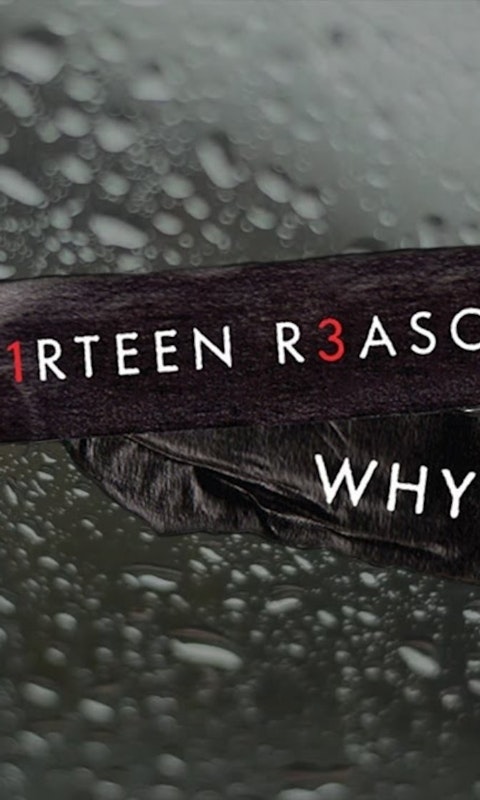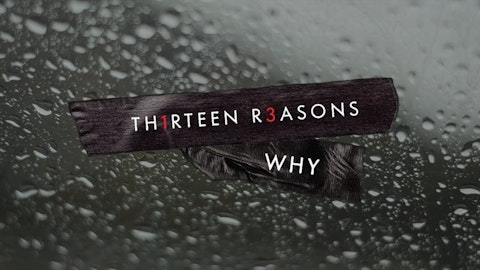
 Support us
Support us


You can hardly open a social media channel without seeing commentary about 13 Reasons Why – a Netflix drama series that explores a range of issues affecting young people, including suicide. The media across the world have been asking whether this a responsible and safe representation of suicide, and now the Australia media has followed suit.
I received a heads-up from colleagues in the United States about the series, with many concerned about the messaging and the depiction of suicide in the program, despite expert advice that was given during the show’s production. However despite concerns, the show is playing on Netflix and being watched by large numbers of people (younger and older) in this country and across the world.
As with any fictional or non-fictional portrayals of suicide, opinions will vary. You only have to read any social media thread to see that people are divided. Some believing that the show is triggering, damaging and sending all the wrong messages about suicide. Others have talked about how useful and helpful is it to be shown the hard realities of suicide and open up a conversation. An issue like suicide will always have that reaction – depending on your personal connection to the issue, the messages you take away can be quite different.

So on the weekend I watched 13 Reasons Why from start to finish – thank you long weekend and a bad cold that had me plastered to the couch. I knew it was very likely that from this week I would be asked for both my personal and professional view on the show. Plus I was completely aware that young people in my life wanted to watch the series and I needed to have a reasonable response and recommendation to make.
As many people have commented online, this program is a piece of fiction. It is a drama series adapted from a book and drama is meant to engage, entertain, and evoke an emotional response. It is not real. However the messages conveyed throughout the show are real and with so many people jumping on board with the hype and “needing to see it,” it is important that people understand what it contains so they can make an informed choice about whether to watch it. They also need to know the content in case family and friends (including teenage children) are watching it and talking about it. Importantly, the way we talk about the series may be even more imperative in shaping the messages people take away from the program.
So here is the rub. I understand why people are divided about how "dangerous" the show may be. Their views are likely to vary depending on their connection to the issue and their understanding of media effects. As someone who is both personally and professionally connected to the issue of suicide, I was really concerned about the messages coming through the program as well as the way suicide was depicted. Here are my Six Reasons Why:
The suicide scene in the last episode of the program is very graphic, drawn out over a number of minutes and very hard to watch. To be honest, I needed to pause and fast forward just to get through it. The detail provided and the length of the scene doesn’t comply with ANY international recommendations about the reporting and fictional portrayal of suicide methods. While there is a warning on the final episode (and the episode before that depicts the sexual assault scene) – people are very unlikely to turn off from watching the final episode of the program even with the warning. We know from sound research that detailed descriptions and portrayals of suicide and suicide methods have been associated with increased distress and increased risk of suicide for people who are vulnerable. I understand strong advice was given in the development of the program not to show the scene in that way and this strong expert advice was ignored. See evidence reviews www.mindframe-media.info/for-media/reporting-suicide/evidence-and-research/evidence-about-suicide-in-the-media
While 13 Reasons Why tries to talk about teenage life and risk factors for suicide, it actually conveys an inaccurate message about suicide, suggesting that there are clear and linear reasons why a person would contemplate or complete suicide. The situation is often complex and for many people there is no clear or obvious reason why a person may be feeling the way they are. Often an individual (including a young person) can feel despair without an obvious reason. The show almost sets a tone that with so many “reasons” that suicide was inevitable, which is not a helpful message to send. But it also does little to legitimise the feelings of others who can’t identify single instances or events that might give evidence to the way they are feeling. Young people need to understand that distress and psychological pain is legitimate and they are worthy of getting support whether there is one reason, 13 reasons or no obvious reasons at all.
The impact that suicide has on others is displayed in the program, but almost as a sub-theme. For example, the anguish of the parents is portrayed well throughout. But others, like the teachers and most of the young people, appeared to be most upset about the tapes, or in the case of the teachers - the lawsuit - rather than Hannah’s death. We know that suicide has devastating and lasting impacts on family, friends and also a wide network of people who knew the person. Towards the end of the program it hints that a second young person dies by suicide, but it doesn’t take the opportunity to draw out or explore the impact that exposure to suicide has as a risk factor to other young people.
For anyone who has lost someone to suicide, the narrative of the series is likely to add to the guilt they may already be feeling about the loss of their friend or family member. The premise of 13 Reasons Why appears to be to make people feel guilty or accountable for what they did or didn’t do in the lead up to Hannah’s death. One of the final messages in the series is that had just one person done something different then Hannah would still be alive. This questioning about “what if” is something that haunts people affected by suicide, and this program is likely to add to that rather than alleviate it in any way.
13 Reasons Why does not encourage young people to involve and talk to adults, or to seek help for their problems. None of the young people in the show speak to an adult about what is going on – either when Hannah (or others) were experiencing issues and dealing with difficult things (such as bullying, sexual assault and physical violence) and they did not seek support from adults following her death. In fact, they went to great lengths to keep information hidden from them. When adults were displayed, they were only portrayed as too busy, uninterested, overinvolved or unable to help. The one time Hannah did seek help – in her words “one last chance at life” the counsellor did not handle the situation well. This provides a poor modelling of how support services work with young people who are in distress or need support. I didn’t get the sense that anything in this drama would encourage a young person to talk to their parents, another trusted adult, a counsellor or a youth mental health service.
The leaving of the tapes and the narrative that “people will be sorry for what they did” plays into the idea that you can make people sorry or teach them a lesson through suicide. With Hannah’s voice echoing throughout the series, it is almost like she is watching this unfold. In some respects this glamorises suicide or presents it as a way to elicit a response from people. But the harsh reality is that Hannah will not get to see or witness people’s reactions at all. Quite concerning are comments I have seen online where young people have been talking about her "death having a purpose" because she has taught other people something. On the other side of this, many people online are commenting about how “selfish” she was to make people feel guilty – again not a good judgement to make or message to send about people who are in despair.
Young people (and people of any age really) are likely to have a range of responses to this piece of fiction about suicide. And those responses can vary greatly depending on whether they have personal experience with suicidal thoughts, if they have been impacted by suicide or are watching it as an interested and engaged teen. I completely support a position put out from headspace in Australia about the importance of parents being across the content that their young people are viewing, and instigating or being prepared to have a conversation about this. It is also important for young people in Australia who have viewed 13 Reasons Why to know where they can get accurate information about suicide, how to get support or how to support a friend or family member they're worried about. I’d also recommend that anyone who is going through a difficult time or those that have been impacted by suicide may want to think about whether a series like this is good for their wellbeing. There have been many people of all ages affected by suicide sending the same concerned message online to others.
If people in Australia are talking about this series or suicide online and sharing information about the program can I ask you to consider the following:
For my media colleagues I would say the following:
Telephone and online crisis counselling - If you cannot access other services or you’d prefer to talk to someone anonymously, you can contact the following telephone or online counselling services:
Lifeline
24-hr counselling and crisis support - 13 11 14 | Crisis Online Chat Service (8pm-12am only) - lifeline.org.au/crisis-chat/
Suicide Call Back Service
24-hr counselling and crisis support - 1300 659 467Online counselling (2:30pm – 7pm every day except Saturday, 10:30am – 3:00pm) suicidecallbackservice.org.au/
Kids Helpline
24-hr telephone counselling for kids, teens and young adults - 1800 55 1800Online and email counselling available at various times - kidshelpline.com.au
MensLine Australia
24-hr telephone counselling for men - 1300 78 99 78Online and video counselling available at various times - mensline.org.au
Beyond Blue
24-hr telephone support service - 1300 22 4636Online chat (4pm-10pm AEST) and support information - beyondblue.org.au
e-headspace
Online and telephone support and counselling for young people aged 12 to 25 - 1800 650 890 eheadspace.org.au
ReachOut.comOnline crisis and mental health information for young people 14-25 years.
National Sexual Assault, Family and Domestic Violence Counselling Line
24-hr qualified and experienced counsellors providing confidential support, information and referral to support services to assist those experiencing sexual assault or domestic violence.
1800 RESPECT 1800respect.org.au
General practitioner or mental health professional
If you have access to a GP, you can talk to them about feelings of distress. GPs are trained in mental as well as physical health and if you need further consultation, they can refer you to a relevant specialist such as a psychologist or psychiatrist.
Published: 19 April 2017